Expert List Water
Part I: Agriculture under conditions of drought
Agronomy: What will the cultivation systems of the future look like?
How must cultivation systems be designed for the future? Climate change and drought, as well as the issue of biodiversity or the transformation of nutrition, are a major factor in the field of agronomy today. How can cultivation systems be designed so that they can cope with these challenges? Can old, new, or little-used crops such as legumes or hemp contribute to the solution in this country? How can digitalization in agriculture support this transformation? Prof. Dr. Simone Graeff-Hönninger will be happy to answer these questions.
Contact:
Prof. Dr. Simone Graeff-Hönninger, Dept. of Agronomy, +49 711 459-22376, email
How new varieties defy climate change
How can the food supply for the world's population be ensured now and in the future - even under increasingly difficult conditions such as the effects of climate change? Plant breeding has a key role to play here. Prof. Dr. Tobias Würschum explains how modern breeding methods can contribute to this.
Contact: Prof. Dr. Tobias Würschum, Department of Plant Breeding, +49 (0)711 459 23544, email
Efficient and sustainable livestock production - even with water shortage
In many developing countries, farmers prefer to raise European high-performance breeds. However, these place high demands on good management, like water supply. Native breeds, on the other hand, are capable of adapting to local environmental challenges, like short-term water shortages.
The agricultural scientist Prof. Dr. Mizeck Chagunda therefore wants to find out, together with his working group, which domestic animal breeds produce efficiently and in a sustainable way despite the influence of extreme environments. Therefore, Prof. Chagunda investigates efficient breeding approaches, livestock husbandry techniques, novel (information) technology, climate change mitigation and adaptation strategies in livestock systems, integrating socio-economic and biophysical determinants.
Contact: Prof. Dr. Mizeck Chagunda, Department of Animal Breeding and Husbandry in the Tropics and Subtropics, +49 711 459 24210, E-mail
Part II: Water saving irrigation
Smart irrigation of urban trees
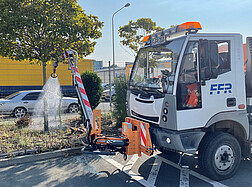
Urban trees in most cities are watered on a rigid schedule with a fixed amount of water. The consequences: some trees die from lack of water, others receive more water than necessary. Here, an intelligent irrigation system could provide relief and conserve resources with demand-based irrigation. Prof. Dr. Henner Gimpel and Dr. Valerie Graf-Drasch from the Department of Digital Management are exploring the possibilities of this technology.
Contact:
Prof. Dr. Henner Gimpel, Department of Digital Management, +49 711 459 24051, email
Dr. Valerie Graf-Drasch, Department of Digital Management, +49 711 459 24051, email
Optimal water use securing good harvests
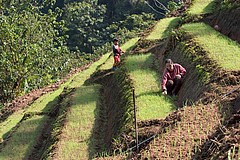
How can farmers in the tropics and subtropics make optimal use of water, that is, in ecologically sustainable and profitable ways? This question is on the mind of agricultural scientist and biologist Prof. Dr. Folkard Asch:
- Rice production: Rice is one of the most water-intensive crops and at the same time the basic food for more than one-third of mankind. Prof. Dr. Asch investigates the effect of reduced irrigation on the yield of various rice varieties.
- Rubber plantations in Southeastern China: The scientist studies the water circulation in the plantations to help the operators make less use of water in the future and thereby protect the vulnerable ecosystem.
- Jatropha: This oil-producing plant, which may also be grown in regions with seasonal drought, could be an alternative source of bioenergy in the future and at the same time provide people in rural areas with additional income.
Contact: Prof. Dr. Folkard Asch, Dept. of Water Stress Management in Crops in the Tropics and Subtropics, +49 711 459-22764, email
Economic irrigation technology
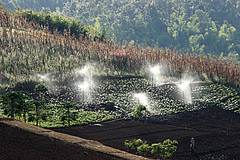
In dry regions, the soils often become over-salinated when farmers artificially irrigate their fields. This does not have to be the case, however. The agricultural engineer Prof. Dr. Joachim Müller is developing a new procedure in which the salt is washed out of the soil using drainage systems, and the drainage water is used for irrigating salt-tolerant crops.
Prof. Dr. Müller is also developing special sensors to ensure that wasting water is kept at a minimum. These sensors are to determine how dry the soil is and how much suction a plant needs to get water. Farmers can then turn the irrigation system on or off depending on need. Highly sensitive sensors that are placed on roots and leaves also have the purpose of measuring whether or not a plant needs water.
Together with his staff, the expert has also developed the so-called deficit irrigation. With this technique, fruit trees receive less water than they could evaporate at certain times. The result: With the targeted drought stress, the trees reduce growth on their crowns and invest their resources in their fruit.
Contact: Prof. Dr. Joachim Müller, Department of Agricultural Engineering in the Tropics and Subtropics, +49 711 459 22490, E-mail
Part III: Optimal water use strategies
To use water in the most efficient way
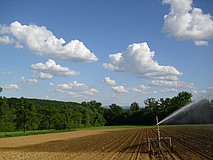
Irrigation, electricity, fish farming, or simply quenching your thirst: Humans use water for all kinds of purposes. This may easily lead to conflicts, especially because clean water is an increasingly scarce resource. That is why agricultural economist Prof. Dr. Thomas Berger explores ways of managing this resource. It is not always clear at first glance what type of water use is the most efficient and best for the environment.
What is the best economic use: a hydroelectric power station or the artificial irrigation of fields? Are there possible compromises? And what are the effects on the environment? Frequently it is easily possible to use the same water multiple times for different purposes. Another question is: Where can farmers save water by using it more efficiently and employing modern technology?
Contact: Prof. Dr. Thomas Berger, Department of Land Use Economics, +49 711 459-24116, email
Part IV: Social and political problems relating to water
Irrigation management in developing countries
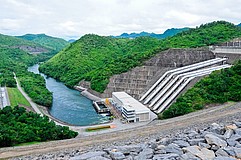
The agricultural economist Prof. Dr. Regina Birner examines institutional and political challenges for irrigation management in developing countries. Her research areas include:
- Governance problems in state irrigation projects, for example building small dams in Ghana or larger irrigation facilities in India (e.g. political influence, mismanagement of funding),
- effects of national irrigation policies on the use of resources, e..g subsidies for using groundwater for irrigation, which could lead to overuse in the case of India.
The researcher’s focus also lies on concrete reform measures that are intended to counteract the problems: For example the transfer of the management of irrigation systems to local water usage associations.
Contact: Prof. Dr. Regina Birner, Department of Social and Institutional Change in Agricultural Development, +49 711 459 23517, E-mail
Part V: Strategies against desertification, erosion, and pollution
How to mitigate erosion and its negative effects
In a DFG collaborative research center, agricultural scientists led by Prof. Dr. Georg Cadisch work to identify mechanisms that protect the soil against erosion. In the mountaineous regions of Thailand and Vietnam, using catch crops in combination with minimal tillage methods has emerged as a promising approach. This means that farmers do not plow their fields multiple times and additionally grow leguminous crops on their fields between growing cycles, thereby reducing the fallow period during which the soil can easily erode.
This is a promising strategy for farmers as well: They have to spend much less time on tillage, and the leguminous crops they can havrest improve the soil and serve as fodder. If erosion takes place nonetheless, the consequences are sweeping. As the research of Prof. Dr. Cadisch has shown, the eroded soil, including its nutrients, is washed into the rice fields in the valley and on into the reservoirs and into the sea. In a worst case scenario, entire water bodies may silt up or collapse.
Contact: Prof. Dr. Georg Cadisch, Department of Agricultural Engineering in the Tropics and Subtropics, +49 711 459 22438, E-mail
Planting trees without artificial irrigation
Brazil’s northeastern regions are being threatened by desertification because trees are being cleared for firewood and wood charcoal and surfaces are being used too intensively for grazing. The agricultural economist Dr. Jörn Germer is attempting to counteract this development. The approach: Certain useful, native types of trees are to be reproduced in order to provide for alternative income possibilities for the local population.
In doing so, the researcher aims to consciously avoid artificial irrigation. As an alternative, he plants the seedlings in a plant-nutrient enriched mix of natural sandy soil, goat dung, and clay soil which can hold rainwater for a particularly long time. In addition, a special vegetable coal ensures that the nutrients are slower to be washed out.
Contact: Dr. Jörn Germer, Department of Agricultural Ecology in the Tropics and Subtropics, +49 711 459 23505, E-mail
How plants absorb and emit water
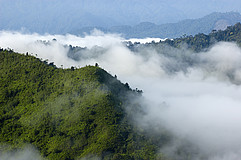
The entire world is made up of spheres. Two of those are the atmosphere (air) and the pedosphere (soil). Water is present to a high degree in both of these. But how do the two spheres exchange water? This is the question which the biogeophysicist Prof. Dr. Thilo Streck is pursuing. Plants play an important role in this. They absorb water from the ground and it evaporates from their leaves. Through this, they then influence the forming of precipitation. In addition, the researcher is evaluating how pesticides and other environmental chemicals spread. What path do they take from the field soils to the ground and surface water?
Contact: Prof. Dr. Thilo Streck, Institute of Soil Science and Land Evaluation, Department of Biogeophysics, +49 711 459 22796, E-mail
Preparing for climate change
From evaporation to humidity to the creation of clouds and precipitation: The meteorologist and climate scientist Prof. Dr. Volker Wulfmeyer is working on a model that will represent the entire water cycle with all its interdependencies and loops. In doing so, he also simulates extreme events such as long droughts and torrential rainfalls with a new resolution of up to 100m and with a span that covers the entire latitude circle around the world.
It is expected that such events will become more frequent due to climate change. That is why these simulations are linked to models from agriculture, business, and society in order to quantify the effects and minimize damage.
For process studies and the verification of the new generation of weather prediction and climate models, the Institute of Physics and Meteorology developed two 3-dimensional laser remote sensing systems that are unique worldwide. With its new climate and weather simulations, the Institute of Physics and Meteorology is included in international working groups of the World Climate and World Weather Research programs and thus brings expertise to the University of Hohenheim that can otherwise only be found at large research institutions.
Contact:
Prof. Dr. Volker Wulfmeyer, Institute of Physics and Meteorology, +49 711 459-22150, email
Part VI: Consequences for the ecosystem
Drought and wet conditions change species composition
Water plays an essential role for vegetation and the prevalence of certain species. The landscape ecologist Prof. Dr. Frank Schurr evaluates how plant communities change when drought or flooding occurs, for example in the middle-European grasslands or in South Africa. The research also takes climate change into consideration, which is expected to cause more droughts and extreme weather events in the future.
Contact: Prof. Dr. Frank Schurr, Department of Landscape Ecology and Vegetation Science, +49 711 459 22865, E-mail
How do plants deal with water?
In agriculture and ecology, one question is fundamental if we want to respond to climate change: How do plants deal with water? The ecophysiologist Prof. Dr. Martin Bouda investigates plant networks - using real, digital and fossil plants. He focuses in particular on plant roots and integrating plant function across scales. With his research, he also wants to contribute to countering climate change: with improved prediction models and better understanding of the evolution of drought resistance in plants.
Contact: Jun.-Prof. Dr. Martin Bouda, Department of Functional Plant Ecophysiology, +49 711 459 23922, E-mail
